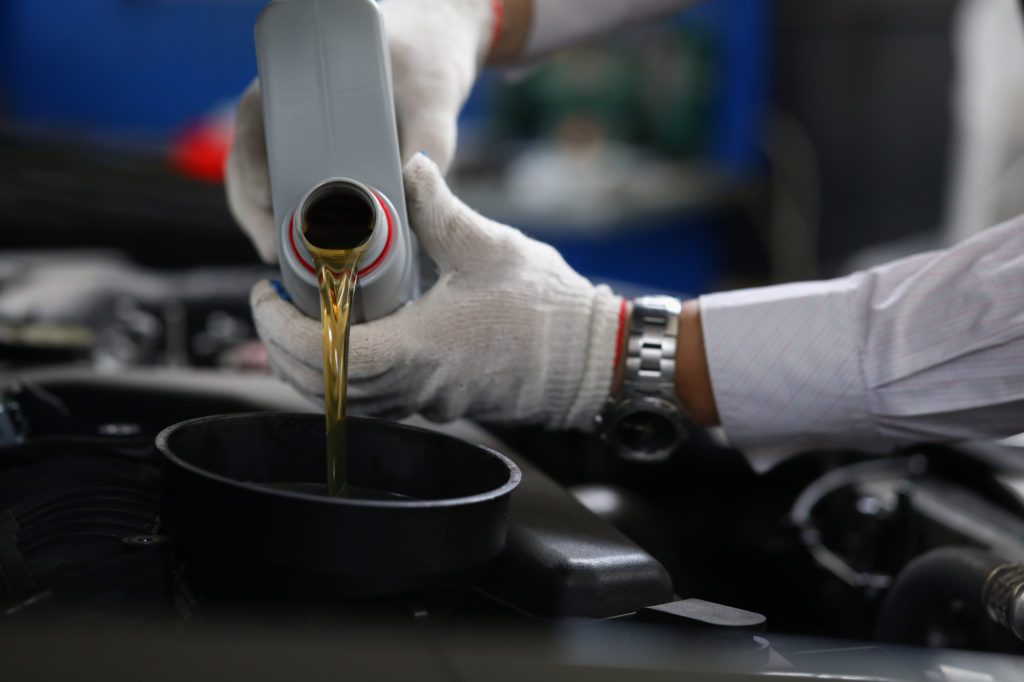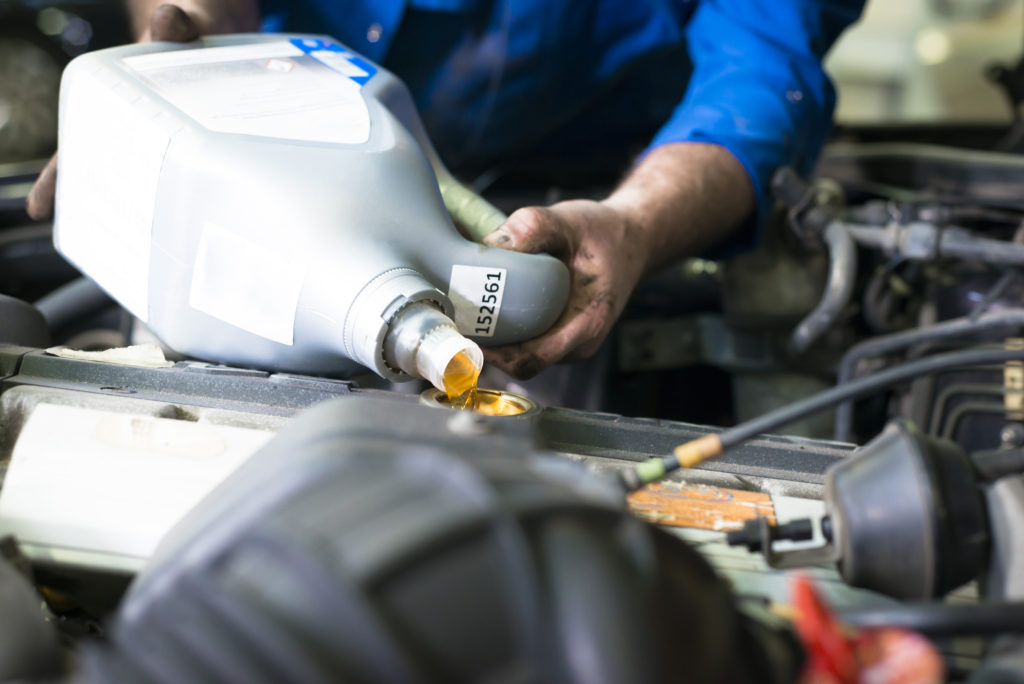Continuously Variable Transmission (CVT), also known as steeples transmission, offers extensive gear ratios and a seamless shifting in the gear ratios.
CVT provides a smoother driving experience and is pretty flexible, unlike other transmissions that only give a restricted number of gear ratios in preset steps.

It requires a supply of healthy CVT transmission fluid to function optimally. The fluid lubricates the transmission to avoid heat dissipation. In return, the CVT system doesn’t rust or show signs of wear hence providing the highest level of performance even at high speeds.
If the manufacturer recommends that you use the CVT transmission fluid in your vehicle, ensure you don’t add any other transmission to it. Otherwise, your car might develop some mechanical problems, leading to costly repairs.
Don’t mistake a CVT fluid for automatic transmission fluid (ATF). The latter has a different chemical composition and won’t work on the gearless, belt-driven CVT.
Usually, a CVT transmission fluid is colored red, but it can be dark red or semi-transparent when clean. Some brands like Nissan manufacture green/golden CVT fluids.
Manufacturers dye this fluid for easier identification and to ensure you don’t add the wrong transmission fluid to your vehicle.
Changing your CVT transmission fluid whenever necessary is essential to your car’s high performance. If you don’t change your CVT fluid, it becomes dirty and black.
This dirty fluid will not act as an effective lubricant to the transmission system, leading to wear and tear on the parts caused by the heat. Always refer to the owner’s manual for a CVT transmission fluid change.
Contents
Types of CVT Transmission Fluid
Manufacturers consider essential factors like engine type, model, and heat dissemination when making CVT fluids. So, you’ll find a range of fluids that serve different vehicles.
Below are the common types of CVT fluids on the market.
OEM Transmission Fluid
OEM transmission fluid is versatile, making it compatible with most CVT vehicles. For this reason, it’s always an easy pick. It’s the go-to transmission fluid for any car owner who isn’t sure which type of CVT transmission fluid will work well with their car.
Universal Transmission Fluid
The universal transmission fluid is widely available and comes at a lower price than the other two. You’ll never miss it in any automobile shop you visit.
Some universal transmission fluids are compatible with all CVT vehicles, while others work well in CVT and automatic transmissions.
Unless you’re entirely sure about the second form of the universal transmission fluid, avoid it by all means if you have a CVT car. The transmission fluid could be compatible only with ATF transmission cars, causing future problems to your vehicle. Only consider buying and using it if you can see a CVT specification on it.
Specific Fluid CVT
Among the three types, the specific fluid is a bit costly and rare to find but goes a long way in caring for your car’s transmission.
The fluid contains specific additives that will only work on specific CTV systems to enhance their performance. One point worth pointing out here is that the CVT system comes in three models: belt-run or pulley, hydrostatic, and toroidal.
Each of these models relies on specific hardware to achieve its gear transitions. For instance, the pulley model employs pulleys to complete its transition, while the toroidal types depend on discs and rollers. On the other hand, the hydrostatic model uses pumps for the same purpose.
Since the engineering in these models differs, they require CVT-specific fluid to function. After knowing the CVT system model your car uses, you have to go for the specific CVT fluid recommended by the manufacturer. That way, you can very well care for its transmission and avoid unnecessary costs brought by incompatible transmission fluids.
The best part about these CVT fluids is that many brands produce them. So, you get the chance to compare prices and have many options. The topmost factor to consider when sourcing them is compatibility with your transmission.
Buying Guide for CVT Transmission Fluids
Here are the key features you should look for when shopping for CVT fluids.
Compatibility
Compatibility is the most crucial feature to consider when buying a CVT transmission fluid. You don’t want to end up with a lubricant that won’t work with your car or, if it does, will cause damages in the long run. In this case, your car model will lead you to the right CVT fluid to buy.
Models like Honda, Nissan, and Ford, are compatible with the three CVT transmission fluids discussed above. That said, CVT transmission car owners should always refer to their manuals to determine the suitable transmission fluid for their vehicles.
If you can’t find your manual for one reason or the other, seek the help of a professional mechanic on the same. Doing this will save you from unnecessary costly damages caused by the incompatible transmission fluid you added to your automobile.
Its Capability
Can the CVT transmission fluid you’re about to buy perform in other areas? What if you shift to a cold or hot region? Will it still protect the transmission system against wear, tear, and corrosion?
These are some of the questions you should ask yourself before spending your hard-earned money on a particular CVT fluid. A high viscosity index CVT fluid will protect the transmission system against corrosion and wear no matter where you reside.
Knowing if the transmission has foam resistance, low temperature, good oxidation stability, and shear stability is a plus. These are some of the properties that make an excellent CVT transmission fluid. The best practice is to buy from reputable brands even if the cost is high. This way, you can be confident the fluid is high-quality, safe, and effective.
The Cost
The cost varies significantly across many brands, depending on the container and how long a CVT transmission fluid can last in your vehicle. You can get one at a lower cost, but how long will it last before it needs replacing? That becomes a bit tricky, especially if you’re looking for a long-term solution.
If you must choose, it’s always a good idea to buy high-quality fluid that will give you an extended service period.
Looking at brands, you can get the same fluid with the same properties, compatible with your vehicle but at different prices. Extensive shopping and price comparison will help you settle for the one selling at a relatively lower price. Whatever you decide, ensure that you’re getting value for your money without compromising on quality.
Quantity
The quantity of the fluid you’re buying is also an essential factor to consider. For starters, how much do you actually need? Are you looking to refill your transmission fluid container, or do you need a complete change/replacement? Knowing this will tell you precisely the amount of fluid you must purchase.
What Is It Made of?
When making a specific type of CVT transmission fluid, manufacturers always have the same result in mind. But do they also use the same method and ingredients to achieve their goal? A simple answer to this question is no, which is very clear from the ingredients section written on the fluid bottles.
In this case, you have two choices to consider, either go with synthetic oil or mineral oil. Though mineral oil is natural, choosing it for your CVT vehicle may leave you dealing with oxidation problems. For this reason, it’s better to go for synthetic oils when shopping for a CVT transmission fluid.
Price Range
First, note that buying CVT transmission fluid in larger quantities will save you money. Most manufacturers sell them in quarts, ranging from $15 to $20 per quart. However, if you prefer a manufacturer’s specific CVT fluid, the price may be higher than what’s stated above.
If you’re buying in large quantities, say over six quarts, most manufacturers sell them from $50, saving you more money in the long run.
You can buy your CVT transmission fluid online and in physical stores near you. Nearly all automobile stores sell these fluids. If you prefer the online route, check on marketplaces like Walmart.
Top Brands for CVT Transmission Fluid
You can easily get confused about the right CVT to buy for your vehicle because many brands sell them. But if you’re here reading this today, then you’re in the right place. This article gives you a list of top brands for CVT fluids.
Valvoline
Founded in 1866, Valvoline is a leading producer and supplier of lubricants and automobile services. With an experience of over 150 years, you can never go wrong with its products, such as the CVT transmission fluid, ATF, antifreeze, and motor oil.
Their Valvoline CVT fluid is perhaps the best in the market. The company designed this fluid for variable transmissions with today’s modern technology. The best part about it is that it will prevent oil film breakdown in your vehicle.
This fluid has a suitable formulation consisting of premium base oils, shear-stable viscosity modifiers, anti-wear additives, and durable friction modifiers.
Its notable features include:
- An advanced additive technology
- It’s full synthetic and protects the transmission system against wear
- Offers excellent metal-to-metal protection
- Provides an anti-shudder performance
- It functions well in belt-run CVT models
Castrol
Castrol is another top brand you can fully trust regarding CVT transmission fluids. The company started way back in 1899 through its founder Charles Wakefield. Although this is a British company headquartered in the U.K., it’s now a subsidiary of B.P. lubricants, an American oil company with headquarters in New Jersey.
Their Castrol Transmax CVT is a good transmission fluid for CVTs. This fluid has superior technology to give you a much-extended transmission period. It’s compatible with many vehicle models, including Nissan, Toyota, Mazda, Ford, Suzuki, and Subaru.
Its features include:
- Enhanced wear protection
- Superior high-temperature performance that helps prevent oxidation
- Advanced technology that ensures you get a longer transmission life
- It comes with an excellent variator torque capacity to help prevent belt slippage
- It also gives enhanced friction durability needed for a smoother drive
Amsoil
Founded in 1969 by Albert J. Amatuzio, Amsoil manufactures and sells synthetic lubricants, filters, and fuel additives. The company headquarters is in Superior, Wisconsin, but serves customers worldwide.
Looking for the best CVT transmission fluid from Amsoil, their synthetic CVT fluid will give you the best results. This fluid provides excellent metal-to-metal friction protection and high performance necessary for CVT vehicles. It’s an excellent choice for belt-and-chain CVTs.
Below are its highlight features.
- It has excellent frictional properties
- It has enhanced wear protection hence quite durable
- It’s resistant to heat
- It offers superior wet-clutch performance
Nissan
Nissan, headquartered in Yokohama, Japan, is a vehicle manufacturer selling over 60 models under three brands, Nissan, INFINITI, and Datsun. Besides vehicles, they have developed several Nissan-specific CVT transmission fluids, including Nissan Genuine OEM CVT-2.
This transmission fluid is excellent for Nissan Altima, tested and approved. Its unique formulation helps protect your Nissan’s transmission system against shuddering, whining, and slipping.
Here are the highlight features of this fluid.
- It maintains the correct pressure even in hot weather
- Its formulated with unique friction modifiers and additives
- It comes made with a unique formulation that will protect your vehicle against whining, shuddering, and slipping
- It will provide your Nissan with an excellent low-temperature fluidity
This transmission fluid is only suitable for Nissan models.
How Often Should You Change Your CVT Transmission Fluid?
How often you change your CVT transmission fluid varies from one vehicle model/brand to the next. For instance, if you own a Nissan, you’ll be required to change your CVT transmission fluid every 25,000 miles.
Generally, change your CVT fluid between 30,000-100,000 miles. Please refer to your manufacturer’s manual to know precisely the required mileage.
It’s worth noting that taking care of your CVT transmission system can help prolong its life expectancy. But how do you do it?
- Keep checking the level of your CVT transmission fluid with a dipstick to refill whenever necessary
- Use synthetic fluid that will help protect against oxidation, heat, and cold
- Always take your vehicle to a professional mechanic for transmission system servicing after covering 30,000 miles
- Avoid transmission overheating by all means. Maintaining your cooling system will help you out with this one

How to Change CVT Transmission Fluid
Before changing the CVT transmission fluid, check if it needs changing. The quickest way to check the fluid level is with a dipstick, but only if your vehicle has a transmission dipstick in the engine bay. If not, a good alternative is taking your car to a mechanic.
That said, several signs will tell you that it’s about time you change your CVT transmission fluid. These signs include finding it hard to shift between gears, hearing strange noises from the transmission like whining or grinding, and acceleration delays.
The best news is that you can change your CVT transmission fluid at home, following these steps.
- Start by lifting your car to get enough room that you can fit in under the car.
- Once you’re in position, locate where the transmission fluid pan lies.
- If there is some fluid left in the transmission and you’re sure it has gone bad, you need to drain it all out. First, unscrew the drain bolt and place a bigger collection pan under it, but remember that this can be a messy affair.
- At this point, before refilling, you must check the conditions of the gasket and the transmission fluid filter to see that they’re in perfect shape. If not, replace them.
- Now, using a funnel and after returning the transmission fluid pan into its position, you can add the new CVT transmission fluid recommended for your vehicle. Remember to dispose of the fluid you had drained.
CVT Transmission Fluid Change Services
Several service centers offer CVT transmission fluid change services, but their charges vary greatly.
Should you visit any Walmart auto care centers, for instance, you’ll pay a $19.88 service fee for the check and fill only. That’s minus the cost of CVT transmission fluid. On the other hand, the pricing at firestone depends on your vehicle’s model and year.
It is, however, a bit more expensive at car brand service centers. At Toyota service center, you may pay between 120-150 dollars for labor alone.
FAQs
What Is the Pricing of CVT Transmission Fluids?
The CVT transmission fluid pricing ranges between $15 to $20 per quart, but you can save some money if you purchase higher quantities.
Can You Mix CVT Transmission Fluid With Regular Transmission Fluid?
Never mix CVT transmission fluid with regular transmission fluid as this may result in the death of your transmission system. You may not notice it immediately, but the damage happens over time, and soon you’ll be forced to replace the transmission.
Can You Use Regular Transmission Fluid in a CVT Transmission?
No, the regular transmission fluid will wear out faster when used in a CVT transmission and might damage your transmission over time. If it happens by accident, you can replace it as soon as you find out.
Is CVT Transmission Fluid the Same as Automatic Transmission Fluid?
No, these two are different. A CVT transmission fluid is only compatible with CVT transmission vehicles, while the automatic transmission fluid only works with automatic transmissions.
Is It Better to Use a Vehicle-Make Specific Fluid or One That Is Universal?
A vehicle-make-specific fluid goes a long way in caring for your transmission, but it’s also a lot more expensive than the universal ones. A good alternative is a universal fluid if you can’t afford the vehicle-make-specific fluid.
How Much Fluid Does a CVT Transmission Hold?
It depends on the vehicle’s capacity. Most CVT transmissions can hold between 9 quarts to 13 quarts. Your owner’s manual will tell you just how much.














